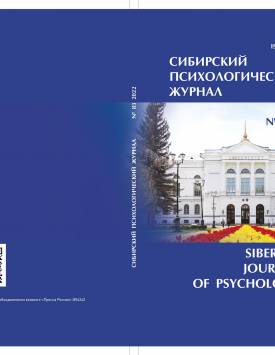The Information and Semantic System of Psychology of Self-Regulation in Conscious Self-Governance of a Person
Introduction. The subfield “paradigm” of modern psychology includes the task of studying the mechanisms of conscious Psychology of Self-Regulation (PSR) in any self-governance and self-realization of the individual in urgent tasks of life. Here a person does not fully control their mental process. They go into auto-pilot and are autonomous mechanisms of mental self-governance. PSR is considered as an information semantic system in which the intellect performs the main function of processing information, self-awareness and conscious control over what is happening in the spatio-temporal continuum of experience and perspectives to life. Research objective: to reveal the role of the intellect (as a cognitive-information system) in the control of arbitrary activity of consciousness in order to build a semantic system of experiences and a structure of meaningful formation in PSR, which allows a person to be selfconscious of life. PSR is understood as a synergistic system of mental activity in the unity of consciousness and unconscious automatisms and attitudes, in the dynamics of the sociocultural interaction of an individual. During the research of PSR of the individual a semantic approach was used to study conscious self-governance of a person. Materials and methods. Sample of students (N=2000, ages 15-50, males 520, females 1480). The study was conducted in a natural setting during training sessions in psychological disciplines in the regions of Ukraine and Crimea (over 17 years). A quasi-experiment was used during introspection of a students work group setting. In a series of introspection experiments, participants completed tasks: stop thoughts, control and organize images, emotions, inner speech, and attention. The semantic properties of the functioning mechanisms of the information-synergetic system of the PSR of the individual, as well as the mechanism of controlling attention with the help of thinking in the organization with stream of thoughts in the mind, were studied. Results. The semantic specificity was revealed in autonomous thought formation of PSR by the inability to stop the stream of thoughts. The need for specificity of governance in PSR by the process of thinking with the help of directed or faceted inner speech with a goal or figurative representations (conscious self-organization of the thought-building process) was seen. The specificity of the automation of the thought-building of consciousness in the aspect of the subjectivity of the semantics of experience became apparent. Further studied was the ability to independently organize a stream of thoughts in autogenic training and meditation, as well as manage the existing automated anxiety complex, transform its content and meaning. Conclusion. As a result of the autonomy of PSR, the subject acts as an "observer" regarding the ongoing processes and phenomena in their mental space, being identified as their thinking and consciousness. The PSR of a person, as a system, functions largely in an autonomous mode of the flow of information-semantic associative-logical programs. An essential task of PSR in life is the management of negative emotions that cause stress and require coping or restructuring by adaptation programs. When emotions fill the content of thinking with meaning. One can manage their thoughts and emotional disturbances, and therefore, mental experience can be carried out by directing attention in that space by organizing the target stream of thought with the help of inner speech and images. All in all directing attention in the right direction of mental activity and turning off other channels of activity.
Keywords
information and semantic system, psychological self-regulation, stream of thoughts, thought formation, subject, subjectness (agency) of the personalityAuthors
| Name | Organization | |
| Dyakov Sergey I. | Sevastopol State University | astropsiyoga@gmail.com |
| Kostromina Svetlana N. | St. Petersburg State University | s.kostromina@spbu.ru |
References

The Information and Semantic System of Psychology of Self-Regulation in Conscious Self-Governance of a Person | Sibirskiy Psikhologicheskiy Zhurnal – Siberian Journal of Psychology. 2022. № 83. DOI: 10.17223/17267080/83/4
